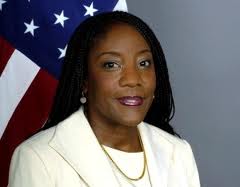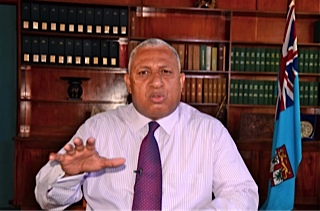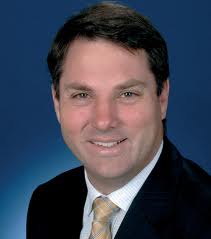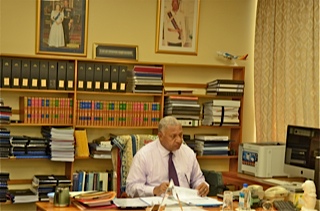"Both Foreign Minster's unscheduled visit to Fiji, is somewhat symbolic in nature, as well as a face saving gesture to restore what shreds of their spheres of influence left intact since their self-imposed absence."
The recent announcement of the nascent Australian Foreign Minister, Bob Carr to visit Fiji, in mid stream of his Washington stop, was quite surprising to say the least . However, Carr's Fiji's stop was undoubtedly influenced by a little chat with the 'foggy bottom' folks quite concerned at Canberra and Wellington's incessant refusal engage directly with the Fiji Government and in the process isolated the Western aligned alliance diplomatically and undermining their regional moves on the geo-strategic chessboard.
Tagging along with Foreign Minister Bob Carr to display a united front, is New Zealand Foreign Minister, Murray McCully who also confirmed his itinerary in joining this last minute Pacific Islands Forum Ministerial Contact Group (MCG) visit to Fiji.
It is understood that other Ministers from Pacific Island Forum (PIF) nations, notably from Polynesian client states are only present to bolster the island look of the Anglosphere duo, Carr and McCully respectively; whose nations dominate the proceedings of the Pacific Forum, an organization deemed as an anachronism by Melanesian and Micronesian states.
36th Parallel interview, (video below) outlines the current seismic change in regional affairs.
This disengagement with Fiji by the Trans-Tasman nations, had subsequently encouraged other friends of Fiji, to close ranks and displace the diplomatic rapport they once held. Both Foreign Minster's unscheduled visit to Fiji, is somewhat symbolic in nature, as well as a face saving gesture to restore what shreds of their spheres of influence left intact since their self-imposed absence.
Another unspoken agenda in their visit of both senior diplomats and colonial cousins from the metropolitan nations, is the ambition to shore up support to the former premier regional multi-lateral organization Pacific Islands Forum(PIF) that has since been languishing in the looming shadow of the regional sub-group Melanesian Spearhead Group (MSG).
Another perspective by Dr. Wadan Narsey provides another independent view.
The excerpt:
Pacific tilting west to PNG – and Super Power rivalry
Pacific Scoop:
Photo: Kiridaresources
Commentary – By economist Professor Wadan Narsey
If this was a news release by a geologist, alarm bells would be ringing around the Pacific and international scientific community. But retitle it “Pacific politics tilting to PNG” and the alarm bells would be ringing in Samoa, Tonga and the Cooks (as I am sure they already are).
However, if Papua New Guinea ever decides to flex its burgeoning muscles, encouraged by a belligerent Fiji, the alarm bells would be ringing loudest in Canberra and Wellington.
Without doubt, Pacific politics is tilting towards the west, drawn by the all-powerful and inexorable gravitational forces of the massive LNG and other minerals wealth being generated in Papua New Guinea (and in West Papua – another sorry saga).
Pacific regional initiatives such as PICTA and EPAs with the European Union (administered by Forum Secretariat in Suva) or PACER Plus (administered through the Office of the Chief Trade Adviser in Vila) are going to be largely eclipsed by the Melanesian Spearhead Group of PNG, Fiji, Solomon Islands and Vanuatu, headquartered in the Chinese built secretariat in Vila. But are the PNG politicians prepared for the leadership role that comes with their wealth and markets?
Or will they be too bogged down in their debilitating internal squabbles for political power so as to ensure preferential access to the massive new wealth flows being created?
Relations with Australia and NZ are going to be a key factor in the direction taken by PNG and the MSG group, and that will depend critically on what PACER Plus offers the PICs, and how fast.
Understanding the complex chop-suey of forces at work in the Pacific is extremely difficult, as the diversity of issues discussed by this article indicates.
Super Power rivalry
But almost certainly, history, time and the “Pacific tilt” are not on Australia’s side. More than a decade ago, US withdrew its Peace Corps programme from the Pacific. But in 2011, US Secretary Of State Hillary Clinton warned the US Senate Foreign Relations Committee not to cut the US foreign aid budget, citing the growing competition with China for global influence, specifically mentioning the Pacific and its vast natural resources.
The US is now back in the Pacific with a large new US Embassy in Suva, to rival the equally large Chinese Embassy. US has also now stationed a small number of troops in North Australia, a move which is seen by an annoyed China as part of the US “containment policy” towards China.
The numbers of US troops will no doubt slowly grow, alarming Australian strategy advisers who see too close an attachment to US military strategies as being potentially harmful to long term Australian economic interests, which are inextricably linked to China’s economic growth (and which was the most significant factor saving Australia from the Global Financial Crisis).
Without doubt, super-power rivalry in the Pacific is now escalating.
PNG will have far more bargaining chips than ever before, especially if its leaders are able to successfully play off one Super Power against another, and take a leadership role in the Pacific, including the MSG.
W. NarseyLargest market
" Pacific regional initiatives such as PICTA and EPAs with the European Union (administered by Forum Secretariat in Suva) or PACER Plus (administered through the Office of the Chief Trade Adviser in Vila) are going to be largely eclipsed by the Melanesian Spearhead Group of PNG, Fiji, Solomon Islands and Vanuatu, headquartered in the Chinese built secretariat in Vila. "
Papua New Guinea with its population of 7 million people is the largest market in the Pacific Island Countries Trade Agreement (PICTA), with the others just making up less than 2 million.
Yet 10 years ago, the PNG market was not given much importance by the other Pacific Island companies because the largely rural PNG consumers were too poor to spend money on modern goods. That has now totally changed with the massive economic growth now taking place in PNG, with equally large investment and consumer expenditures from both the private sector and government.
Foreign companies, including Australian, are taking a renewed interest in PNG. Even Fiji companies have made a beeline for PNG, pushed abroad by the last six years of economic stagnation in Fiji. All of a sudden, the Melanesian Spearhead Group (MSG) of PNG, Fiji, Solomon Islands, and Vanuatu has become the substantial integration movement in the Pacific, totally eclipsing PICTA.
The MSG is also achieving trade integration advances which PICTA has failed to deliver while PACER Plus totally stagnates.
Pacific countries will continue to talk endlessly on PACER Plus, as they did when PICTA was being negotiated, with every tiny trading or local commercial interest dragging the negotiations down to a snail’s pace, to the financial delight of an army of consultants.
This strengthening of the MSG has been assisted by Fiji’s belligerent attitude towards Australia and NZ, secretly admired by the political leaders of PNG, Solomon Islands and Vanuatu, who have long harboured intense resentment at what they perceive to be the paternalistic and condescending attitudes of Australian and NZ political leaders towards the Melanesians.
Underlying all this antagonism is the virtually taboo subject of Australian and NZ racism against the Melanesians, which surfaced in an oblique way at a recent conference at Deakin University in Geelong on PNG’s future.
Melanesians feel racism
This two-day conference produced many useful contributions from Australian and PNG academics and participants. But one jarring note in an otherwise diplomatic opening address by the debonair Sir Charles Lepani (PNG High Commissioner to Australia) was his emotional complaint about the “galling” barriers faced by PNG nationals requiring a visa to come to Australia, while Australians come and go freely in PNG. This observation was greeted with applause by the largely white Australian audience, who had faced such difficulties when trying to get visas for PNG nationals.
Another senior and influential bureaucrat, a “mover and shaker” in PNG, complained bitterly that he had been coming to Australia for four decades, yet the Australian immigration department still wanted his bank balance and his grandparents’ addresses.
Ironically, while speaker after speaker (both PNG and Australian) complained about the post-independence debilitating deterioration in PNG civil service efficiency and widespread corruption, eminent Professor Ross Garnaut threw in a sobering reminder that the decades in which Australia controlled PNG before independence was “no golden era” for PNG people either, when they were required to have a permit to even come into their own capital, Moresby.
The conference was also reminded by yours truly that while Australia easily and freely gave out more than 600,000 work/holiday/study visas to a number of mostly white countries, PNG had yet to be confirmed for a quota of a mere 100
‘Blackbirding’ memories
Melanesian countries still remember their people being “blackbirded” a century ago, to clear the land in Australia for white farmers, and then callously and cruelly expelled (with the Chinese and Indians) to create the “White Australia” after federation in 1905 (led by Prime Minister Deakin). Today, the Melanesians are affronted that the descendants of that early slave labour are clearly not wanted in Australia in the way whites are.
In an evening function, very senior PNG people (including white Australian PNG “old hands”) confided quietly that the negative Australian attitude to PNG people was racism pure and simple – a continuation of the “White Australia” policy.
Few from the Melanesian Pacific would disagree, as they see that the Pacer Plus negotiations are bogged down by Australia on the one benefit that the Pacific countries feel would balance all the many costs of pure trade integration.
All PICs want is reasonable access for unskilled PIC “guest workers” into Australia – to ease their home unemployment and increase their valuable remittance earnings which has kept poverty at bay in several countries such as Fiji, Samoa, Tonga.
But for almost a decade now, Australia has been dragging its feet on proposals to let a few thousand Pacific Islands workers come to pick fruit, all under tightly controlled conditions, while 600,000 young workers from Europe, with minimal control or organisation whatsoever, come and go with a year’s permit for work and/or holiday, readily granted.
Add Sino-phobia
Many political strategists in Australia and NZ are worried about China’s rapid incursion into Pacific economies and politics, even though China is merely doing much the same kinds of things which other Super Powers and donors have done in the past century.
China may be extremely secretive about their financial flows to recipient countries and politicians. For instance, there is little publicly available data about what exactly are the loans which many Pacific countries are taking on for future generations.
But unlike Australian and NZ, China has little concern for insisting on local governance standards or basic human rights of the PIC citizens.
Sadly, the Western powers excluded China in their regional discussions with PICs, as I pointed out at a PIDP meeting in Honolulu early in 2011, on the future of the Pacific. The improbable excuse given was that there were “visa difficulties” for Chinese delegates.
It is open to question whether China will be any less racist or paternalistic or condescending than Australia or NZ. But Chinese diplomats are not likely to make the political gaffes which Australian politicians make regularly with respect to the Pacific.
Australian failures
Australia’s failure to win the hearts and minds of Pacific political leaders may be contrasted with NZ’s greater success with Pacific countries, and with their Maori population.
No power-hungry Pacific politician is ever going to prise the Cook Islands, Tokelau or Niue (or even Samoa and Tonga) out of New Zealand’s camp.
Even Kiribati is now over the moon with Fiji, which has offered (sold) them a large block of land which will have more earth in it than all of Kiribati combined. While Kiribati’s President Tong hastily said the purchase was for food security and not settlement, there is little doubt that it also is going to provide a refuge for any I-Kiribati climate change refugees.
The I-Kiribati know that Tuvaluans are already quietly and happily acquiring property in Fiji, with no fuss whatsoever from Fiji authorities. Tuvaluans are hard-working law-abiding residents of Fiji, enjoying all the benefits of good education for their children, health services for their sick, and a hospitable social environment.
Massive Australia, despite its daily acknowledgement of significant labour shortages for the foreseeable future, has made no such grand symbolic gesture towards the atoll countries which would have cost it so little and gained so much. It is not surprising that, apart from a few small Polynesian countries, the rest of the Melanesian and Micronesian Pacific has refused to speak out against the military regime in Fiji, despite the considerable diplomatic pressure from Australia and NZ.
"Many political strategists in Australia and NZ are worried about China’s rapid incursion into Pacific economies and politics, even though China is merely doing much the same kinds of things which other Super Powers and donors have done in the past century. "
The PICs all know that Australia has been dragging its feet for a decade on PACER Plus negotiations and refusing to budge on access to Pacific unskilled labour, while the smaller NZ economy has had a small guest worker scheme operating very successfully for several years.
Australian needs to pay more attention to PNG views: one speaker at the Deakin conference on PNG futures quite bluntly told the gathering: “If Australia does not want to play ball with PNG, then we will play ball with China”.
The reality is that PNG is now positioned to lead a mass break-out of the economic barriers that Australia has built up against the ordinary poor and unskilled black populations in the Pacific.
While perpetually decrying the deterioration in governance and public services in PNG and other Melanesian countries, Australia has been ruthlessly extracting the very professional and skilled PIC citizens, whose departure is one fundamental cause of PIC economic and social disintegration.
It is a paradox to many Pacific economists why Australia is so backward in its policies towards the Melanesian countries.
Saying ‘sorry’
In the absence of any great Australian awareness of Australia’s exploitation of Kanaks in the past, it might be difficult to argue that Australia has any subconscious guilt complex towards Melanesians, as they seemed to have towards the Aboriginals.
But Australian political leaders, after a century of silence, finally said “sorry” to Aboriginals for all the horrifying injustices done to them in the past. It would be an interesting PhD to examine whether saying “sorry” has made any improvements at all to the political relationships between Australian and Aboriginal political leaders, and more importantly, to the welfare of the Aboriginals whose conditions are closer (by all the MDG criteria) to the poverty stricken people in sub-Saharan Africa, than to the rest of white or Asian Australia.
Perhaps the Melanesian countries should demand that Australia also say “sorry” to them, for the atrocities committed against the Kanak labourers a century ago. Acknowledging those past brutalities (and you might first need a few TV documentaries to drive that message home to the unaware Australian public) might encourage Australia to treat Pacific Island countries fairly and with human decency in the PACER Plus negotiations.
If PACER Plus delivers on the unskilled labour market benefits that PIC leaders want, and quickly, then Australian and NZ politicians might also have fewer nightmares about being outmanoeuvred by China in the Pacific, plus enjoy a lot of benefits as well.
Dr Wadan Narsey is a Fiji economist, academic, former parliamentarian and independent media commentator. He is a regular columnist on Pacific Scoop and Pacific Media Centre Online.
Club Em Designs























